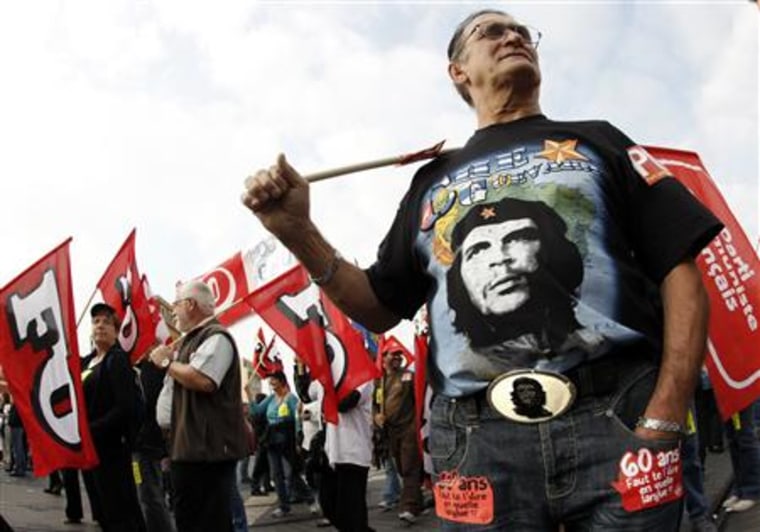Scattered fuel shortages rattled drivers and businesses across France on Saturday, as tens of thousands marched for the fifth time in a month to protest President Nicolas Sarkozy's plan to raise the retirement age to 62.
Frequent strikes in the last few weeks have hobbled French trains and airports, closed schools and docks, and left garbage piling up in the southern port of Marseille.
But now the airline industry is getting worried, after all of France's 12 fuel-producing refineries went on strike and many depots were being blocked by protesters. Police were called in to force three crucial fuel depots to reopen Friday, including one outside Marseille.
The Civil Aviation authority sent out an advisory Friday night to airlines requiring short- and medium-haul flights to Paris' Charles de Gaulle airport — one of Europe's key hubs — to arrive with enough fuel to get home, spokesman Eric Heraud said.
"They must come with a maximum capacity in their fuel tanks," Heraud said by telephone. "Obviously, these instructions apply only to short- and medium-haul flights" of less than four or five hours because trans-Atlantic flights cannot "double carry" fuel.
As fearful drivers headed to the pumps, Finance Minister Christine Lagarde urged the nation not to panic.
"Today, there is no reason, no reason ... to panic," she told BFM-TV on Saturday, noting that only 230 of the country's 13,000 gas stations were out of fuel. "There are weeks of reserve."
The Ecology Ministry, however, said fuel stocks at Paris' Charles de Gaulle airport — one of Europe's key hubs — were good only until Tuesday and the fuel pipeline to the airport was working only intermittently.
"I don't say we can't guarantee beyond Tuesday ... we will find other solutions," a ministry spokesman told The Associated Press. He said France had not yet resorted to emergency fuel imports from neighboring Italy or Spain.
Heraud, of the Civil Aviation authority, said the pipeline that supplies Charles de Gaulle and the smaller Orly airport south of Paris began feeding fuel from the Atlantic port city of Le Havre again Saturday, assuring enough fuel at the main airport until Wednesday.
"That leaves time for parallel supply means," notably by truck, he said. Orly airport has 17 days' worth of available fuel, Heraud said.
A sign Saturday at a gas station in Feyzin, near the eastern city of Lyon, announced a fuel shortage at all pumps, frustrating motorists there and elsewhere.
"When the government says there will be no shortage, it means there will be a shortage," said Bernard Martin, a 60-year-old retiree who found no fuel at a Carrefour gas station in Ecully, near Lyon. "Since this morning, there is no more diesel fuel."
Dominique Bussereau, France's transport minister, authorized oil companies to use some reserves after trucking companies complained of difficulties finding fuel.
Police estimated some 825,000 people marched in cities across France, lower than during an Oct. 12 march — and far lower than the union estimate of 3 million.
In Paris, huge balloons rose above a vocal crowd that police counted at 50,000 as marchers made their way from the Place de la Republique to Place de la Nation on the city's eastern edge. Unions claimed 310,000 protesters marched.
Police, many in civilian attire, watched for troublemakers as youths joined the protest movement. The youth factor has traditionally proved a volatile element in French demonstrations, raising emotions and drawing in hooligans. More than 300 high schools went on strike this week and scuffles with police left one student seriously injured.
"The more the government tells youth that their place isn't in the street, the more they mobilize," said student leader Jean-Baptiste Prevost of the UNEF union.
Countries across Europe are cutting spending and raising taxes to bring down deficits and debts that hit record levels after the 2008 financial crisis resulted in the worst recession in 70 years. Labor leaders, students and civil servants are fighting back.
"(These protests are) an attempt to say stop abusing the workers and citizens," Christian Coste, head of the CGT Union at Total's La Mede refinery, told Associated Press Television News on Saturday. "We are not here to bring France to its knees and create a shortage, we are here to make ourselves heard."
Workers have been striking for five days straight at the La Mede refinery in southern France.
On the streets of Marseille, garbage was left uncollected for the fourth straight day and firefighters had to extinguish some rubbish piles set afire.
Sarkozy's pension reforms — especially raising the retirement age from 60 to 62 — are seen by unions as an attack on their near-sacred social protections. Yet the government says that is the only way to save the money-draining pension system and insists French workers must work longer because they are living longer.
Even at 62, France would have one of the lowest retirement ages in Europe.
In cities excluding Paris, some 340,000 protesters were out by midday, according to the Interior Ministry. Unions insisted the figures were higher.
Saturday's protests will not be the last. Another round is set for Tuesday, a day before the French Senate is to vote on the pension reform bill.
